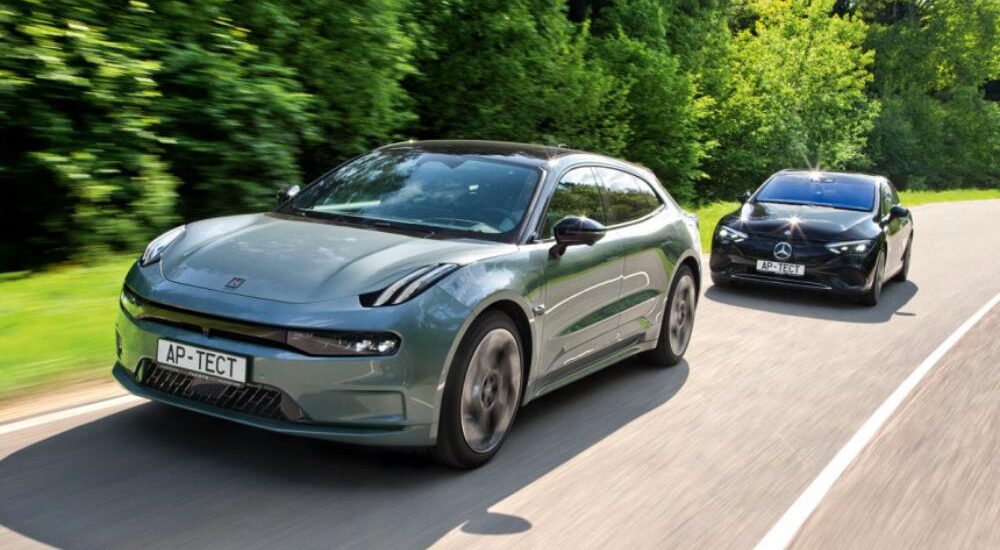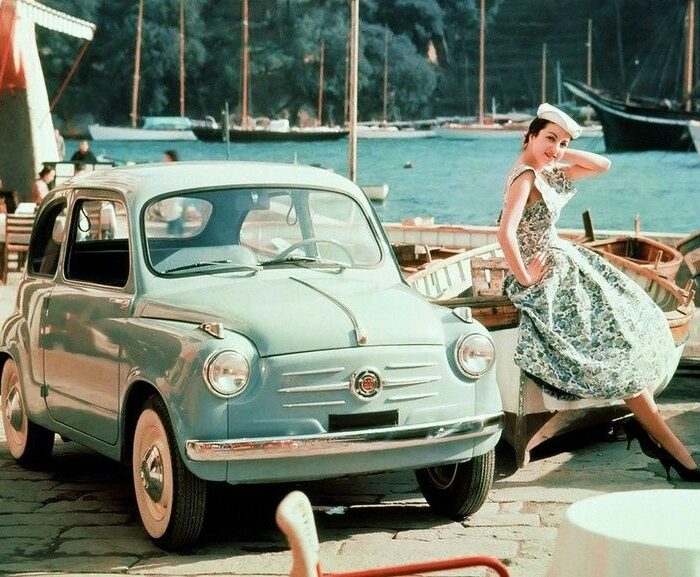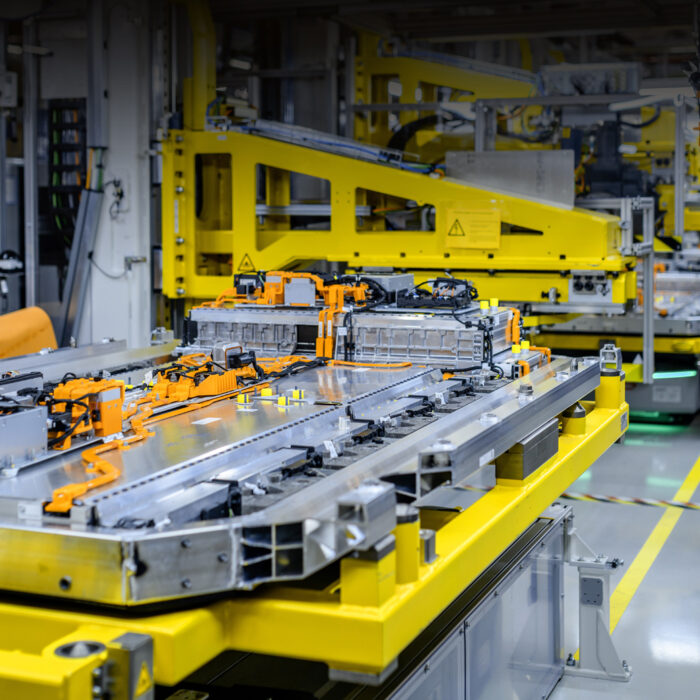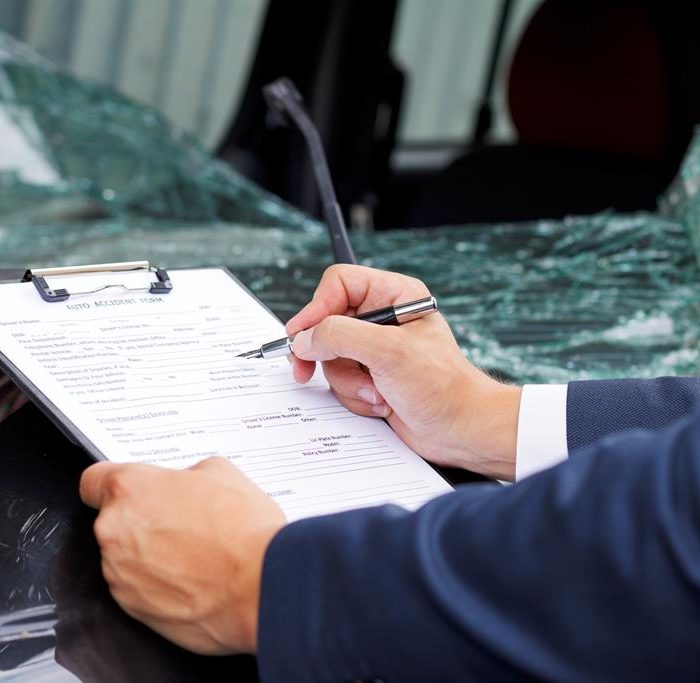2021, une autre sous-marque haut de gamme de Geely, Zeekr 001, dévoile son véhicule électrique construit sur cette plateforme. Samission est de se faire une place dans le peloton de tête et de rivaliser avec des véhicules électriques de renom tels que la Mercedes-Benz EQE, mais les chances sont-elles vraiment bonnes ?
Souvenez-vous, lorsque le boom des crossovers a commencé il y a une vingtaine d’années, un test d’Auto Review sur deux commençait par une phrase : ce constructeur a tout ignoré, d’autres produisent déjà des pseudo-tout-terrain surélevés, et il vient à peine de lancer un SUV sur le marché. C’est exactement ce qui me vient à l’esprit à propos de Mercedes. Après tout, non seulement l’entreprise qui porte le nom d’un visionnaire serbe, mais aussi une douzaine d’entreprises chinoises ont déjà fait ce dont Mercedes vient de parler. Leur programme électrique a été lancé à Stuttgart il y a sept ans – et il était prévu que d’ici 2022, Mercedes-Benz commercialise dix modèles électriques, tous basés sur une plateforme modulaire distincte.

À ce jour, il n’existe que quatre modèles de ce type. Et si vous n’avez pas de mètre ruban avec vous, vous pourriez même dire qu’il y en a deux, car les EQS et EQE de Mercedes se ressemblent, à l’exception des dimensions. Et elles sont réellement construites sur la dernière plate-forme de l’architecture électrique modulaire. Nous avons donc aujourd’hui une bataille en trois lettres : MEA contre SEA.

Le panneau en plastique à la place de la face avant n’est pas très esthétique. Moyennant un supplément, il peut être entièrement recouvert avec Hyperscreen.

Bien que numérique, il n’en reste pas moins un classique. Il n’y a pas de problème de lisibilité, vous pouvez choisir une option de design différente, mais dans tous les cas, ce sera plus pratique que dans Zeekr.
Les autres Mercedes électriques sont basées sur des modèles essence traditionnels, et la nouvelle vague de Smarts électriques est même construite en collaboration avec Geely sur la plateforme SEA. Quel coup de pouce du destin !

Le graphisme MBUX est toujours à la pointe du progrès. Accès rapide aux applications grâce aux boutons.
En matière de design, on peut dire que la bataille d’aujourd’hui se déroule au fond de la mer. En effet, Mercedes imite clairement un habitant des profondeurs. Là où il n’y a jamais de soleil et où personne ne vous verra jamais, c’est typiquement là que vivent ces beautés. Aucune règle d’or du design automobile n’a été respectée ! Le prolongement du montant avant « frappe » l’angle du pare-chocs alors qu’il devrait passer par son centre, et l’espace dans l’énorme empattement de trois mètres peut accueillir près de quatre diamètres de roue et demi au lieu des quatre habituellement admis. D’étranges raccords entre le capot et l’aile, une longue surface latérale qui a nécessité des inserts parce que les portes ne pouvaient plus être étirées. En revanche, elle affiche un admirable coefficient de traînée de 0,22 !

Vous ne pouvez régler la position de base du siège EQE qu’à l’aide des boutons, l’ajustement plus précis se fait à l’aide du menu sur l’écran.

Les boutons de réglage du siège sont étonnamment rigides et leur course est courte.
Mais comme l’a dit Enzo Ferrari, l’aérodynamisme est fait pour ceux qui ne savent pas construire des moteurs. Zeekr ne cherche pas à être la plus efficace, mais ses deux moteurs électriques délivrent une puissance combinée de 544 ch. Les deux voitures sont équipées de batteries de la même capacité de 100 kWh, mais pour Mercedes, elles sont fabriquées par LG, et pour Zeekr, par CATL. En outre, Zeekr a récemment présenté une version dotée d’une batterie de 140 kWh. Ces liftbacks ne sont disponibles qu’en traction arrière, et l’autonomie selon le cycle chinois CLTC (analogue au NEDC) dépasse le millier de kilomètres ! Cependant, de nombreux tests de véhicules électriques chinois nous ont déjà permis de constater que dans la réalité, on peut sans crainte soustraire un tiers, voire la moitié, des valeurs indiquées sur le passeport. Même dans ce cas, c’est toujours impressionnant.


La EQE offre également une climatisation séparée pour la deuxième rangée.
Notre Zeekr, avec une consommation moyenne en été d’environ 22 kWh/100 km, a une autonomie réelle d’un peu plus de 400 kilomètres. C’est tout à fait suffisant ! Mais face à la Mercedes, qui est arrivée au terrain d’essai de Dmitrovsky par ses propres moyens depuis Tambov (environ 530 km), elle n’impressionne plus. En conduite normale, l’EQE permet de parcourir 500 kilomètres avec une seule charge, et avec un peu d’économie, on peut aller jusqu’à près de 600 kilomètres. Le propriétaire de cette Mercedes, Alexey, est un passionné de voitures électriques à longue distance. Et il a commencé à le faire bien avant d’acheter la EQE. J’ai été particulièrement impressionné par l’histoire d’Alexey concernant ses déplacements à bord d’une Smart électrique – par exemple, en rechargeant à… une scierie. Comme il n’y avait pas d’autre choix, les gars ont débranché la scie de la prise triphasée et ont branché la Smart. Et ça a marché !

Mercedes dispose d’éléments de lancement. La commande de la transmission est également historique – sur le levier de la colonne de direction.
La Mercedes est arrivée sur le terrain d’essai avec une consommation moyenne de 17 kWh/100 km. Il s’agit peut-être d’un record parmi les voitures électriques d’une telle puissance et d’un tel poids (2385 kg sur notre balance, la Zeekr à double moteur ne pesant que 23 kg de plus). Et c’est un bon signe : un constructeur automobile traditionnel a réussi à fabriquer une pièce électrique efficace, sans se contenter de brancher une batterie sous la carrosserie d’une berline ou d’un crossover produit depuis longtemps, comme Mercedes l’a fait avec le reste de sa gamme de véhicules électriques.

Le compartiment pour les petits objets et les porte-gobelets sont cachés derrière un couvercle brillant.
Cependant, l’intérieur de la EQE est avant tout une voiture. Familière, moderne et pratique. Excellents sièges, instruments compréhensibles, le meilleur système multimédia contemporain MBUX – nous avons enfin pu le comparer directement avec les systèmes chinois actuels. Et Mercedes remporte clairement ce duel. Il est compréhensible que les onglets et menus propriétaires ne soient pas aussi importants que les onglets et menus tiers, tels que la navigation ou la bibliothèque musicale. Mais les deux fonctionnent mieux avec l’EQE. Le système audio Yamaha de la Zeekr n’arrive pas à la cheville des haut-parleurs Burmester de la Mercedes en termes de détails et de dynamique.
Mais la Zeekr elle-même n’est certainement pas en reste en termes de dynamique!

Les caméras panoramiques de l’EQE fournissent une image claire et fluide pendant la conduite, alors que l’image de la Zeekr est parfois saccadée.
Mais attendez, vous voulez examiner cette voiture électrique. Vous appuyez sur la poignée de la porte et celle-ci s’ouvre d’elle-même ! Cependant, la cérémonie s’avère un peu longue. Si vous vous tenez trop près ou pas dans le bon angle, le processus s’arrête puis reprend – j’aurais préféré ouvrir la « porte » moi-même. Mais la fermeture automatique après avoir soulevé la poignée intérieure – c’est cool.

La Mercedes n’a pas de coffre avant, même sur la version à moteur unique. Cet espace n’est pas du tout destiné à être ouvert par le propriétaire : la poignée est cachée sous un cache décoratif, et il n’y a même pas de butée sur le capot lui-même.
À l’intérieur, Zeekr impressionne par la qualité des matériaux – même sur les photos, il est clair que la Mercedes a une finition plus simple. Toutefois, sur la EQE, par exemple, il est possible de commander un immense écran Hyperscreen qui couvre l’ensemble de la face avant. Mais le prix serait alors beaucoup plus élevé. L’EQE d’Alexey coûte aujourd’hui à peu près le même prix que la Zeekr, soit environ 88 000 dollars.

Une nouveauté des concepteurs allemands est la tubulure de remplissage du liquide de refroidissement située derrière un volet de l’aile.
Et à prix égal, la « chinoise » se vend beaucoup mieux. Alcantara, cuir souple, toit en verre à transparence réglable. De quoi faire bonne impression sur les esprits en herbe des voitures électriques. Mais le siège, bien qu’il ressemble à un baquet sportif, est placé trop haut et son profil n’est pas réussi. Le minuscule écran d’instrumentation est difficile à lire et, d’une manière générale, nuit à la perception de l’habitacle – comme si l’on avait fait des économies sur le conducteur. Ou s’agit-il d’une allusion aux capacités de conduite autonome ?

La Mercedes est une fastback, donc son coffre est d’une architecture traditionnelle de berline. Il est spacieux, mais n’a pas la même ouverture que celui de Zeekr. Notez que les charnières passent sous la garniture.
Après tout, les deux voitures électriques sont équipées de radars, de caméras d’ambiance, et sont entraînées à suivre le leader même sur des routes assez sinueuses. Et vous savez, la Mercedes EQE est probablement l’un des premiers cas où j’ai passé le volant et les pédales à la voiture sur une vraie route avec un certain plaisir. La Mercedes n’attend pas le dernier moment, lorsque la roue dépasse déjà le marquage de la voie, mais commence immédiatement à dévier doucement le volant. Et si d’habitude, j’entreprends cette expérience par simple nécessité professionnelle, dans l’EQE, j’ai parcouru une bonne partie d’une autoroute de banlieue très fréquentée sans me tenir au volant.

Les enjoliveurs aérodynamiques recouvrent presque entièrement la roue Mercedes – pour dévisser le capuchon de l’embout, il faut se battre un peu.
Et Zeekr, semble-t-il, n’a pas suivi les leçons de pilotage automatique. La stupidité typique des réponses pour la plupart des « croisières » actives – un freinage trop brusque et trop tardif, même à faible vitesse. Et hélas, le bobsleigh qui passe d’un marquage de voie à l’autre. Heureusement, ils existent. Et dans le tout premier virage légèrement plus serré, le « zéro-zéro-premier » s’est dirigé en toute confiance vers le fossé, sans panique ni avertissement.

Le design en forme de poisson de l’EQE n’est pas impressionnant, mais l’arrière-plan correctement choisi contribue à améliorer la perception – nous remercions le club de golf LINKS pour son aide dans la réalisation de la prise de vue.
Mais je n’exclus pas qu’avec la mise à jour du logiciel, la situation s’améliorera – après tout, comme Tesla, Zeekr reçoit des mises à jour par voie hertzienne, à l’instar d’un smartphone.

Je dois admettre que j’étais persuadé à l’avance que j’assisterais à une nouvelle démonstration de la puissance de l’industrie automobile chinoise moderne et que l’avant-gardiste Zeekr ne laisserait rien au hasard pour ce qui est de la Mercedes électrique. Ou cellule par cellule. Mais…

Zeekr a été séduit par la forme et le design classiques du volant. La colonne de direction n’est d’ailleurs pas équipée d’un levier de réglage séparé, comme sur les Tesla. Il faut aller dans le menu et utiliser une télécommande tactile sur le rayon droit.

Le petit écran d’instrumentation ressemble à celui d’une moto moderne. Il n’est pas très lisible – les informations principales sont fournies par un projecteur placé sur le pare-brise.
La EQE est la meilleure voiture électrique que j’ai conduite ! Certes, la Polestar 2 était plus dynamique et plus sportive, mais l’équilibre global des qualités de la Mercedes aux allures de poisson est plus élevé. Je ne sais toujours pas comment se conduit l’ancienne EQS, mais ce fastback plus compact séduit par son niveau de confort.

Le système multimédia de Zeekr n’a été que partiellement traduit du chinois jusqu’à présent, mais vous mémorisez rapidement tous les caractères nécessaires grâce au menu logique. Et le plus important, c’est qu’il n’y a aucun problème pour installer des applications tierces.

La même architecture de menu était présente dans la voiture hybride Li L9 et dans certaines voitures BYD : une nouvelle norme chinoise. Pour accéder aux paramètres de conduite importants, il suffit de faire glisser l’écran vers le bas, comme sur un smartphone.
Il est étonnamment silencieux jusqu’à la vitesse maximale, et la suspension pneumatique, qui a rempli ses ballons d’air, gère rapidement et imperceptiblement tout ce qui se retrouve sous les roues. De plus, dans les cours non défrichées, il sera utile de pouvoir augmenter la garde au sol de 137 mm à 163 mm. Pour Zeekr, c’est le niveau de base, et il peut aller jusqu’à 206 mm. Enfin, une voiture électrique est apparue dont le niveau de bruit est exactement ce qu’il devrait être en l’absence de moteur à combustion interne : proche de zéro. L’EQE est loin d’être belle, mais ces formes fonctionnent vraiment, il n’y a pas du tout de bruits aérodynamiques.

Les ceintures de sécurité colorées sont un élément brillant de presque tous les Zeekr. Le siège est beau, mais en réalité, le profil du dossier s’est avéré problématique.

L’habitacle de la Zeekr ne présente pratiquement aucune individualité, mais la qualité ne diminue pas, même dans les petits détails – comme dans une bonne chaîne d’hôtels.
Pour cette raison, vous conduisez souvent trop vite : il y a trop peu de sources d’information entrantes. C’est pourquoi un coup d’œil au compteur de vitesse surprend parfois : quoi, déjà 120 ? Il est amusant de constater qu’un niveau de confort élevé peut entraîner un surcroît de travail pour le châssis dans les virages.


L’accueillant Zeekr permet aux personnes de grande taille de s’asseoir confortablement. Les dossiers sont inclinables et il existe une zone de microclimat séparée. Cependant, les sièges avant hauts bloquent presque complètement la vue avant, et l’accoudoir central est incliné vers l’avant.

La troisième zone de climatisation n’est disponible que dans la configuration We initiale.
Et l’EQE s’en accommode. La réactivité du volant est importante et semble nous ramener à l’époque où Mercedes utilisait un boîtier de direction. Mais le rythme des réactions n’était pas aussi élevé à l’époque. En mode de suspension standard, le corps est excessivement mobile en conduite rapide – il soupire sur une vague, il s’assied sur une roue chargée dans un virage. L’algorithme sportif des amortisseurs ramène tout à la normale, sans que l’on puisse dire que la fluidité du parcours en souffre sensiblement. En conduite rapide sur route de campagne, il peut être utilisé par défaut. Et si, bercé par l’atmosphère détendue de l’EQE, vous abordez un virage trop rapidement, votre montre intelligente ne marquera pas de pic de pouls ici : Mercedes glissera brièvement avec ses roues avant, réduisant ainsi sa vitesse, et reviendra à la trajectoire correcte.
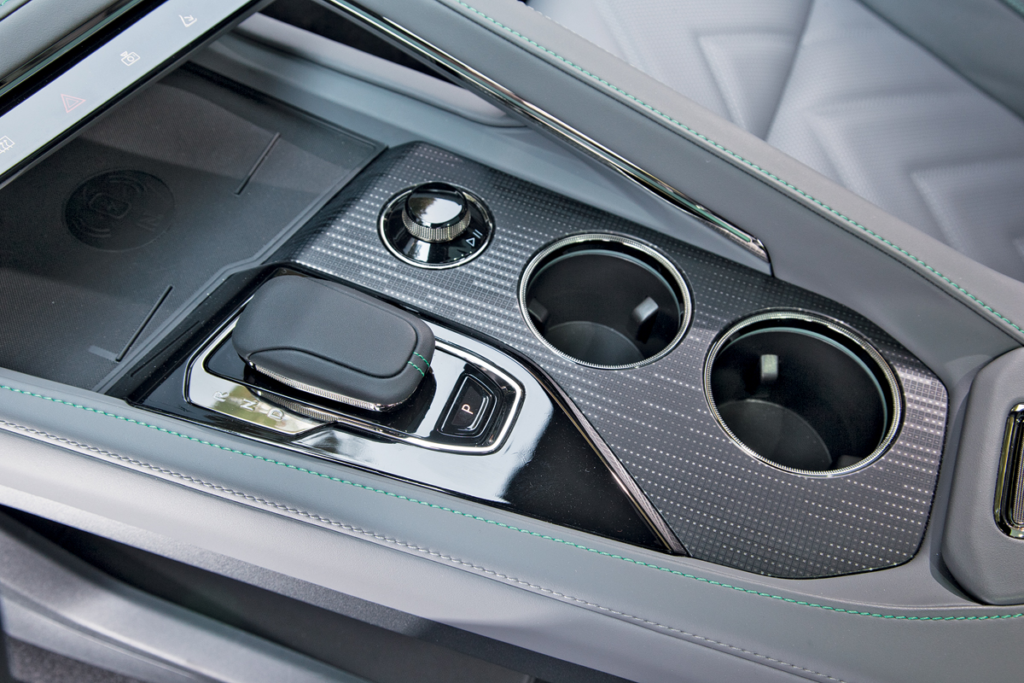
Le joystick de transmission Zeekr ressemble à un galet de plage – il tient parfaitement dans la main et se déplace avec un effort agréable.
Oui, il n’y a rien à lui reprocher ! A moins qu’il ne s’agisse d’une banquette arrière inconfortable. Il y a de la place pour les jambes, mais le coussin est bas et dur, et le dossier est installé trop verticalement pour une raison quelconque. Avec un tel niveau de confort de conduite, on a envie de s’allonger à moitié pour admirer le kaléidoscope de couronnes d’arbres dans le hayon panoramique.
Mais le Zeekr est-il incontestablement meilleur en termes de dynamique ?
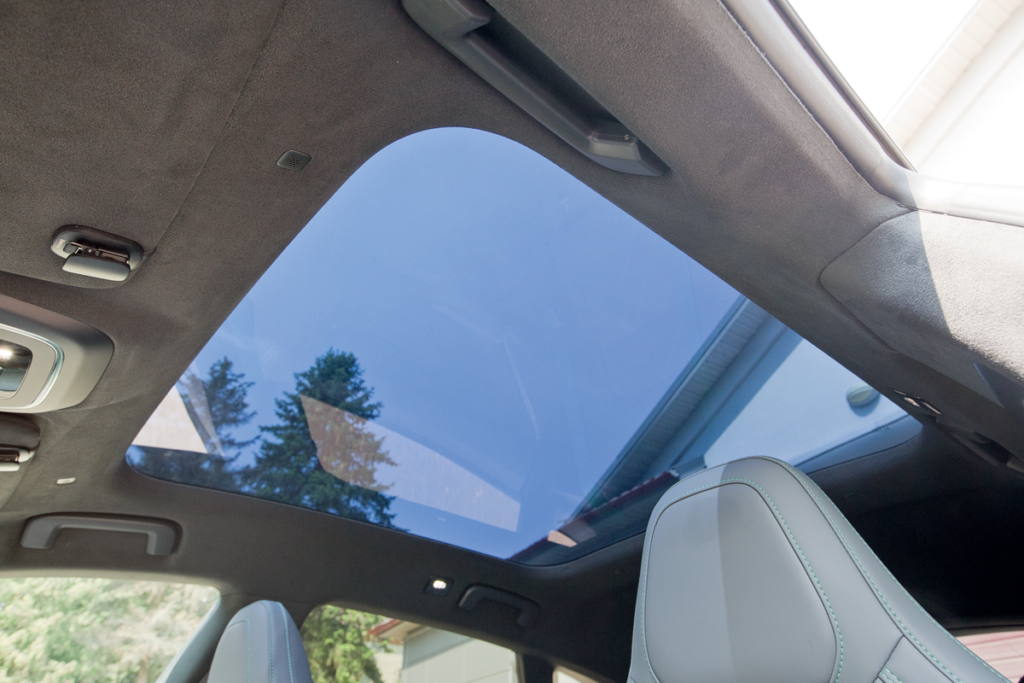
Le toit panoramique électrochrome de Zeekr peut modifier la transmission de la lumière automatiquement ou sur commande à partir du menu – de presque transparent à bleu foncé, comme sur la photo. Dans ce mode, le verre retient 99,9 % des rayons ultraviolets et le facteur de protection solaire SPF atteint 50. Mais des rideaux non originaux sont déjà vendus sur le marché chinois.
Oh oui, réjouissez-vous, amateurs de plaisirs simples et momentanés ! La pédale d’accélérateur est au plancher – et votre déjeuner vous revient de l’estomac. Certes, Zeekr n’a pas montré les 3,8 s annoncées, mais seulement 4,1 s de sensations désagréables – et déjà 100 km/h. Et 200 au compteur, c’est encore dix secondes plus tard, après quoi « l’agent 001 » se heurtera au limiteur de vitesse.
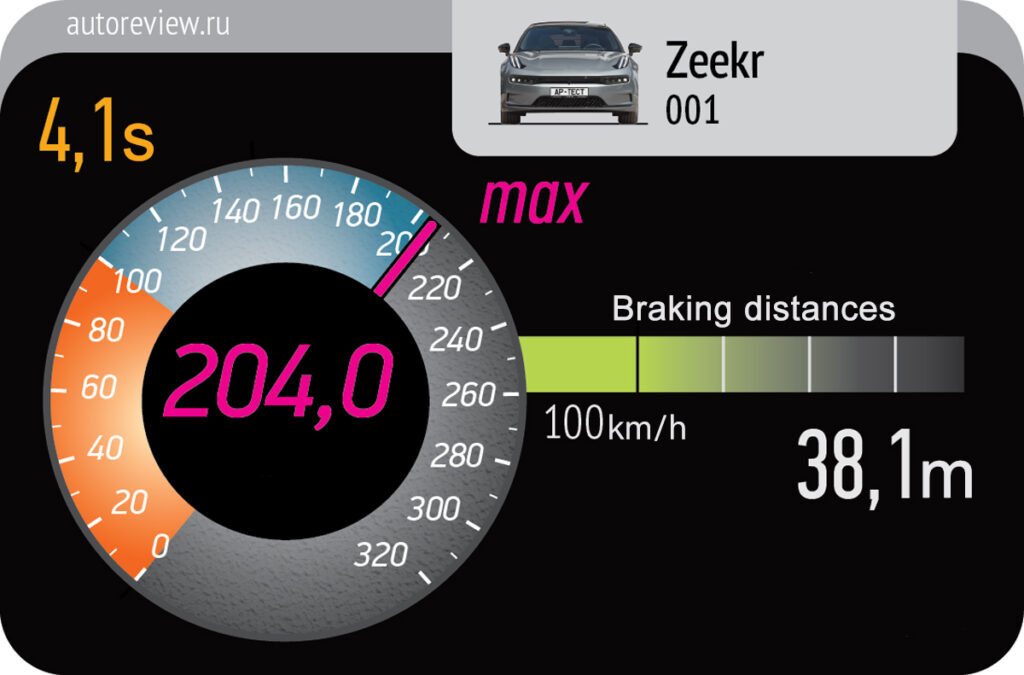
D’ailleurs, lors de ces mesures, j’ai enfin compris ce que je déteste dans les voitures électriques si puissantes : le sentiment d’être devenu une sorte de poupée, un mannequin de test. Comme une marionnette, je suis poussé dans le dossier pendant l’accélération, et mes organes internes sécrètent tout sauf de la sérotonine. Même dans les voitures à moteur à combustion interne les plus dynamiques, cet effet ne se produit pas. Il y a du son, il y a de l’anticipation pendant que la voiture vibre en mode « launch control ». Enfin, il y a les coups et les secousses lors des changements de vitesse. Et ici, vous vous balancez simplement sous le hurlement d’un moteur électrique.
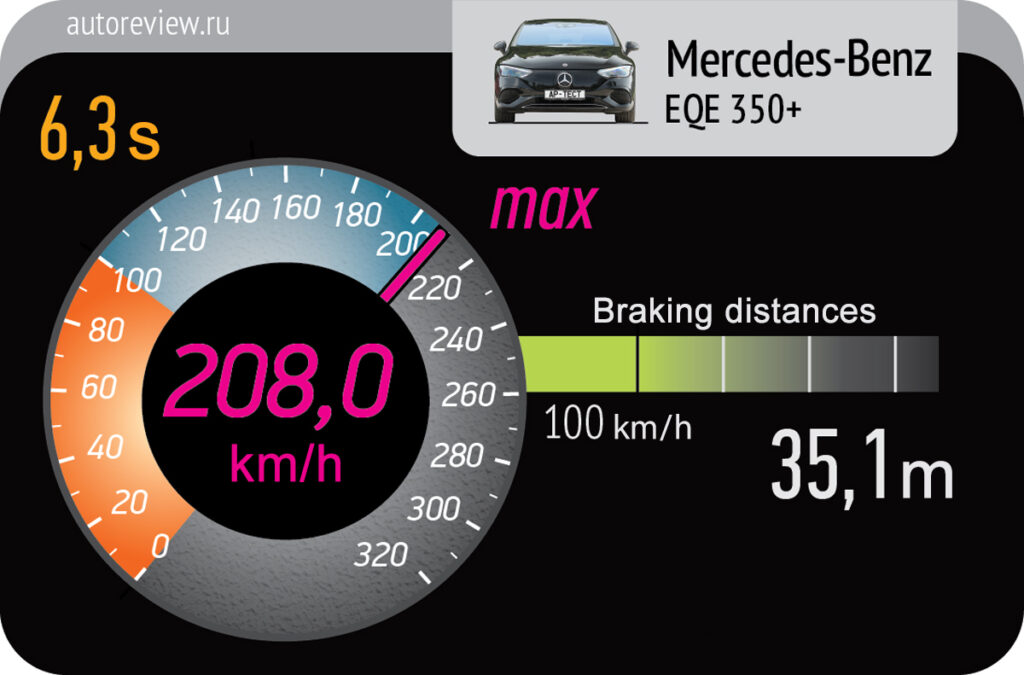
Par conséquent, l’EQE, avec ses 6,3 secondes pour « cent », plutôt modestes selon les normes d’aujourd’hui, mais tout à fait suffisantes dans la vie réelle, me plaît davantage subjectivement – on n’a pas l’impression d’être devenu un participant involontaire à l’expérience. Après tout, même en mode économique, la Zeekr réagit vivement à la pédale d’accélérateur, alors que la Mercedes le fait de manière linéaire. De plus, la Mercedes est dotée d’un système de contrôle du niveau de récupération très pratique, grâce à des palettes de changement de vitesse. En appuyant sur la droite, comme si l’on montait le rapport par habitude, on sélectionnait le mode free-rolling. En appuyant sur le levier de gauche, on obtient un niveau normal assez doux, et un autre clic permet d’activer une décélération plus efficace. Mais pour conduire avec une seule pédale, comme le font de nombreuses voitures électriques, l’EQE n’est pas formé. Je vous ai déjà dit qu’il est conçu pour ne pas rompre avec les habitudes conservatrices des voitures.
| Voiture | Mercedes-Benz EQE 350+⠀⠀ | ⠀Zeekr 001 |
| Vitesse maximale, km/h | 208 | 204 |
| Temps d’accélération, s 0-60 km/h 0-100 km/h 0-150 km/h | 3,0 6,3 13,4 | 2,3 4,1 7,7 |
| Sur une distance de 400 m | 14,1 | 11,8 |
| 60-100 km/h | 3,3 | 2,1 |
| 80-120 km/h | 4,3 | 2,6 |
| Distances de freinage à 100 km/h, m⠀⠀⠀ | 35,1 | 38,1 |
Zeekr, au contraire, est extrêmement éloigné des voitures ordinaires et est parfaitement contrôlé par une seule pédale. Cependant, le niveau de décélération au tout début, lorsque vous venez de relâcher la pédale de droite à 60-80 km/h, est à mon avis excessif et réduit déjà le confort de mouvement. Surtout pour les passagers.
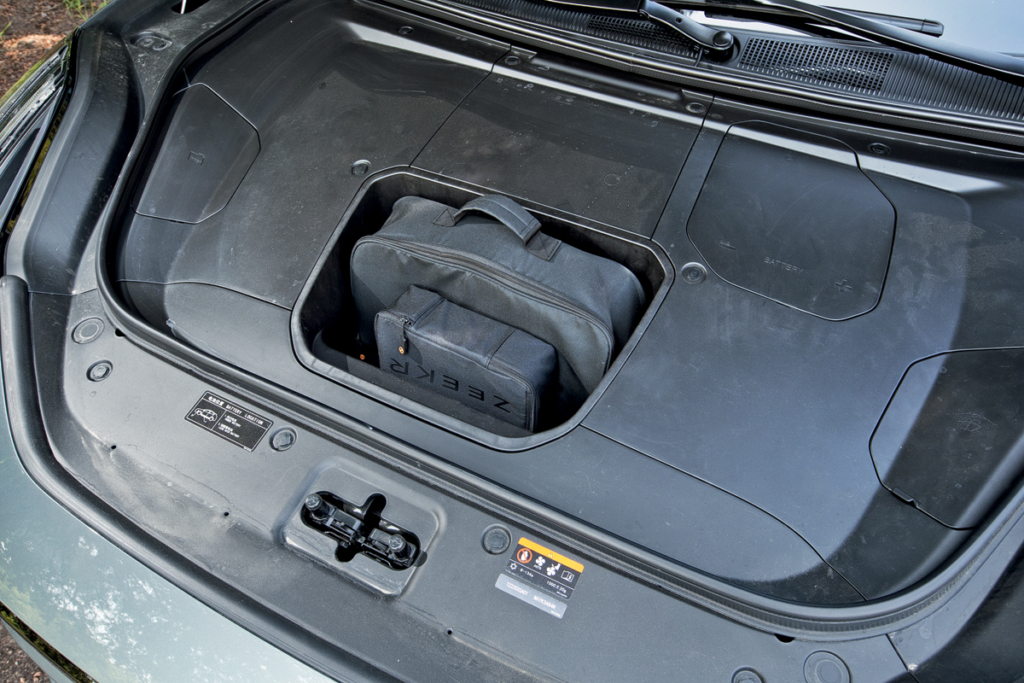

Le coffre avant, ou frunk, si apprécié des conducteurs électriques, est nominal dans Zeekr, mais le coffre principal à l’arrière est très bon : on peut changer le niveau du plancher, la finition est excellente.
Le confort n’est pas du tout le point fort de Zeekr, et si la différence d’acoustique avec Mercedes est notable, mais pas dramatique, en termes de douceur de roulement, ce liftback est le premier depuis la fin. Du moins dans cette comparaison. En mode confortable de la suspension pneumatique, il combine habilement les coups durs sur la suspension avant avec une poupe berçante. En même temps, la tenue de route est plutôt mauvaise. La direction est tendue et peu naturelle, et la netteté des réactions ne correspond pas à la rigidité angulaire de la suspension. Il en résulte des problèmes de précision : Zeekr entre dans les virages par à-coups et, en cas d’erreur, a tendance à déraper, ce que le système de contrôle de la stabilité considère comme une situation parfaitement normale et n’intervient pas. Si vous « récupérez » les amortisseurs en mode Sport, la douceur de roulement disparaîtra complètement, mais la maniabilité ne sera pas au rendez-vous. Certes, Zeekr vacille moins, mais son comportement ne procure pas de plaisir de conduite. Et comme la direction devient plus lourde ! Heureusement, en mode individuel, il est possible de la laisser plus légère avec une suspension plus ferme. D’ailleurs, Zeekr a confirmé son caractère instable lors du réarrangement : il s’est systématiquement engagé latéralement dans le troisième couloir, l’électronique intervenant au niveau de l’homéopathie. A notre avis, une remise à zéro s’impose.
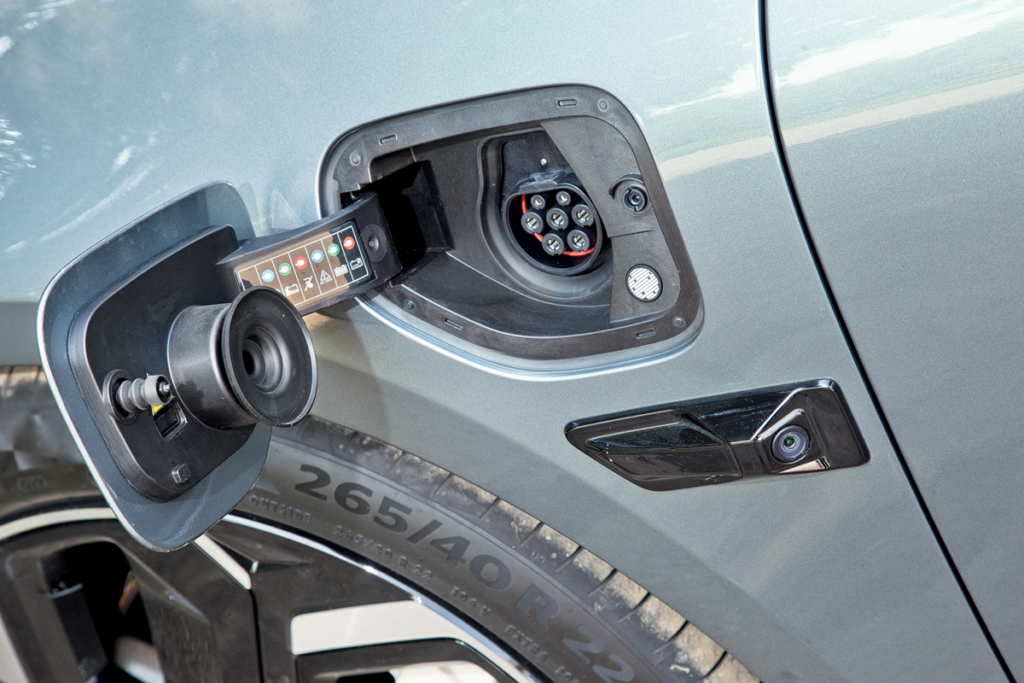

Les prises de charge des véhicules électriques sont généralement situées dans les ailes avant, comme le col du réservoir d’essence sur les voitures de sport Porsche.
Pour les vrais acheteurs, il ne s’agit même pas d’un élément de troisième ordre. Le propriétaire de cette Zeekr, Ivan, a échangé sa BMW 550d pour cette voiture et est satisfait de tout, même s’il admet que la voiture électrique chinoise n’est pas à la hauteur en termes de maniabilité. Mais le design, la qualité d’exécution… Le nouveau format de mobilité, en fin de compte. Oui, les batteries modernes ne vous obligent plus à regarder constamment l’autonomie restante. Pour moi, c’était peut-être le premier essai de véhicule électrique où nous avons simplement roulé autant que nous le voulions. Et comme nous le voulions.

À l’exception d’un large espace entre le coffre et les ailes arrière, la carrosserie de la Zikr est construite selon des normes très élevées.
De plus, Alexei n’a même pas pris la peine de recharger la Mercedes sur le site d’essai – il a suivi tout le programme avec nous et s’est rendu à Moscou, où il a fait le plein. Le lendemain, il s’est rendu à Tambov avec une consommation moyenne de 15,8 kWh/100 km. Avec une planification intelligente, vous pouvez même voyager en voiture électrique et la EQE est peut-être la première voiture sans moteur à combustion interne que j’utiliserais volontiers pour mes trajets quotidiens en ville.

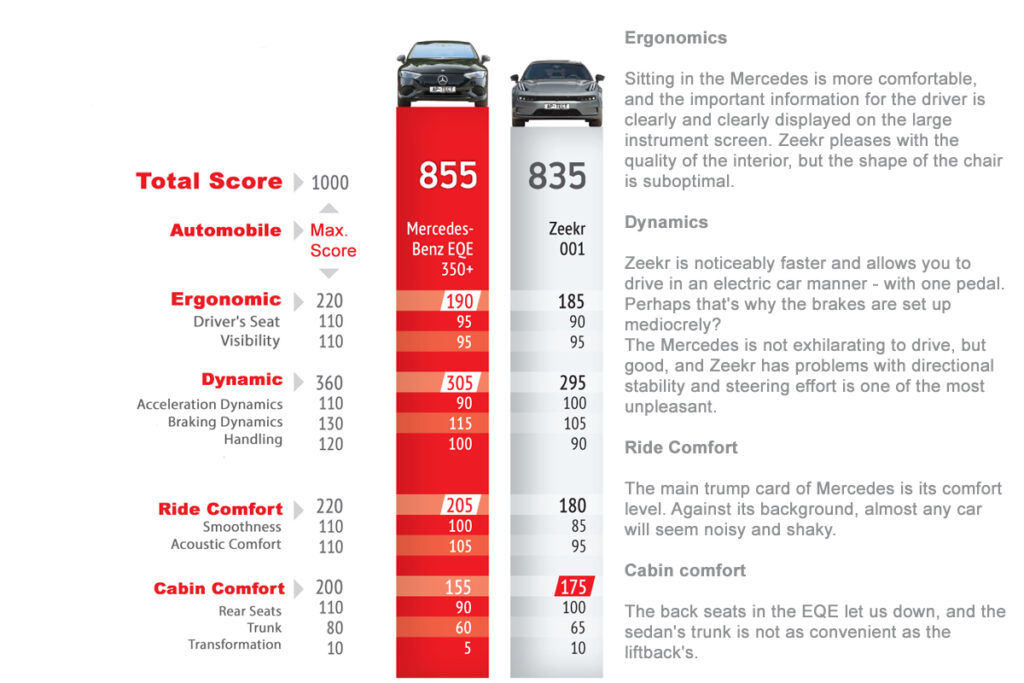
Les situations d’urgence.
Oui, la Zeekr fait une plus forte impression en statique que la Mercedes, mais la différence de sensations lors des manœuvres d’urgence est encore plus grande.
L’embardée de la Mercedes ne semble pas particulièrement urgente. Jusqu’à 72 km/h, l’EQE chaussée de pneus Pirelli P Zero suit la trajectoire sans déraper. Puis, en revenant sur sa voie, un petit dérapage se produit – un signal d’alarme pour le système de stabilisation. Anticipant son développement, il commence à créer une dérive, en freinant activement la roue avant extérieure. Et à une vitesse de 79 km/h, il devient déjà impossible de revenir de la voie en sens inverse.

Il s’oppose à Zeekr ! Mais latéralement et vers le fossé dans un dérapage mal contrôlé. Tout le contraire de Mercedes : les dérapages qui démarrent à la même vitesse ne sont pas du tout éteints par l’électronique ici – nous n’avons absolument pas remarqué un travail clair du système de stabilisation. Le « zéro-zéro-premier » glisse simplement sur le côté dans le troisième couloir, et déjà dans ce couloir, il est tourné vers l’angle opposé du dérapage. Si le conducteur s’en est sorti, c’est bien – Yaroslav a réussi à le faire à une vitesse de 76,1 km/h.
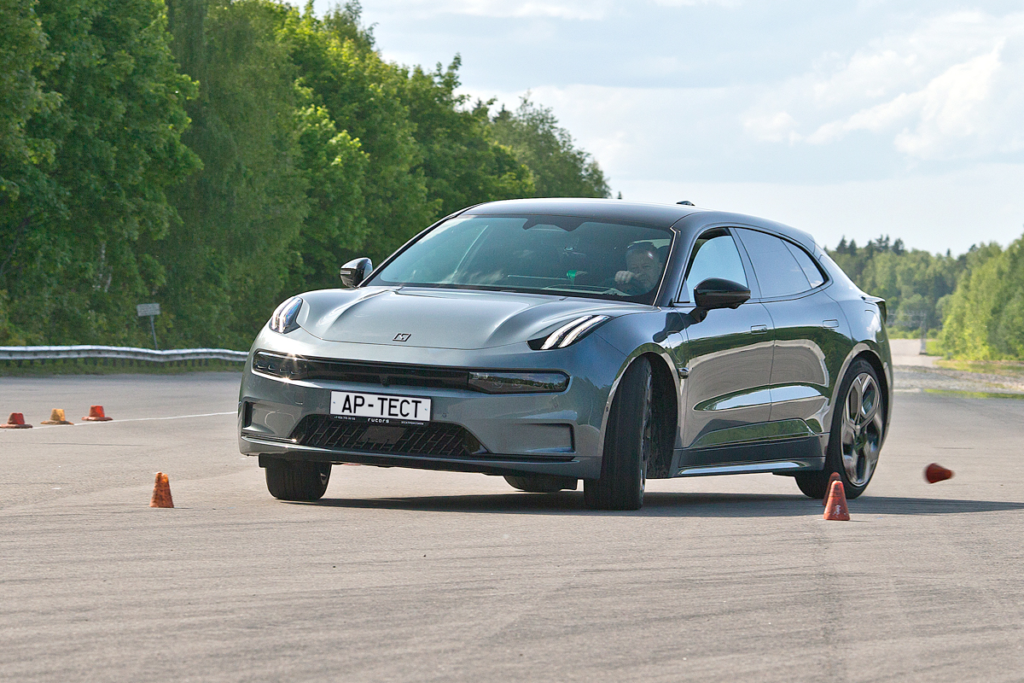
Ainsi, au volant de Zeekr, il est beaucoup plus sûr de ne pas dépasser, mais de freiner. Cependant, l’ABS ne fonctionne pas de manière très moderne, offrant un niveau de décélération moyen et une distance de freinage de 36 mètres – alors que la Mercedes était capable de s’arrêter quatre mètres plus tôt.Vitesse d’exécution du test de l’élan, km/h :
Mercedes-Benz EQE – 79,0
Zeekr 001 – 76,1

Dimensions, poids* et répartition du poids le long des axes
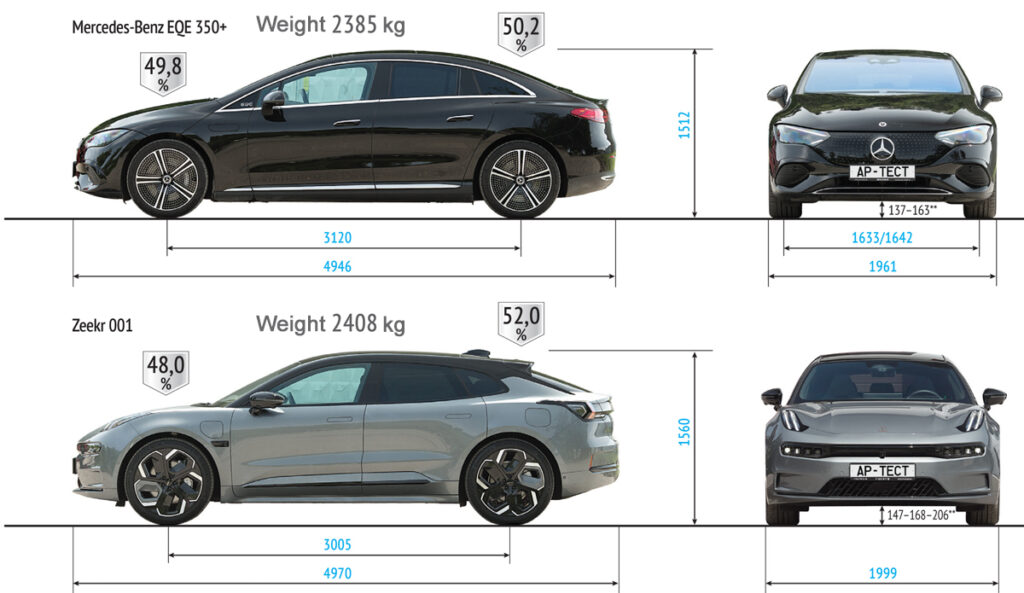
* Poids réel du véhicule sans conducteur
** Selon le mode de suspension pneumatique
Données du passeport:
| Voiture | Mercedes-Benz EQE 350 | Zeekr 001 |
| Dimensions, mm Longueur Largeur Hauteur Empattement Voie avant/arrière | 4946 1961 1512 3120 1633/1642 | 4970 1999 1560 3005 n.d.* |
| Volume de l’appel, l | 430 | 2144** |
| Poids à vide, kg | 2310 | n.d. |
| Coefficient de traînée, Cd | 0,22 | 0,23 |
| Type de moteur de traction | Synchrone, sur les aimants permanents | Synchrone, sur les aimants permanents |
| Emplacement du moteur de traction | Transversalement sur l’essieu arrière | Sur les essieux avant et arrière |
| Puissance maximale, hp/kW | 292/215 | 544/400 |
| Couple maximal, Nm | 565 | 768 |
| Batterie de traction type | Lithium-ion avec une capacité de 100 kWh⠀ | ⠀Lithium-ionavec une capacité de 100 kWh |
| Tension de la batterie, V | 328 | 407 |
| Unité d’entraînement | Arrière | Traction intégrale, avec système d’entraînement individuel moteur électrique sur chaque essieu |
| Suspension avant | Indépendante, pneumatique, à quatre leviers | Indépendante, pneumatique, sur double triangulation |
| Suspension arrière | Indépendante, pneumatique, lien multiple | Indépendante, pneumatique, lien multiple |
| Vitesse maximale, km/h | 210*** | 205*** |
| Temps d’accélération 0-100 km/h, s⠀ | 6,4 | 3,8 |
| Réserve de cycle WLTP/CLTC | 624/— | —/606 |
| Puissance de charge maximale en courant continu, kW⠀ | 173 | 360 |
*n.d. – pas de données
** Jusqu’au plafond, avec les sièges arrière rabattus
*** Limité par l’électronique
Photo : Dmitry Pitersky Dmitry Pitersky
Il s’agit d’une traduction. Vous pouvez lire l’article original ici : Электромобили Zeekr 001 и Mercedes-Benz EQE : море волнуется

Publié Août 16, 2023 • 20m à lire

